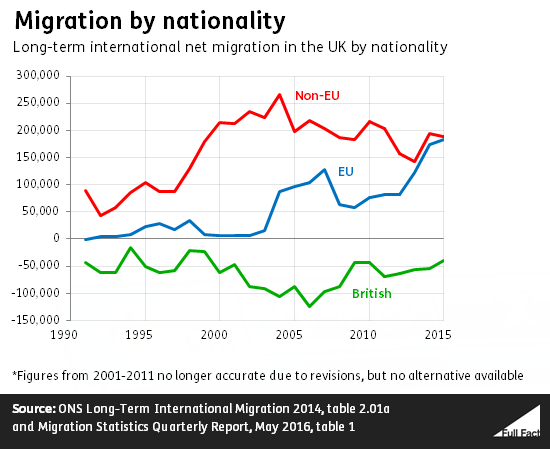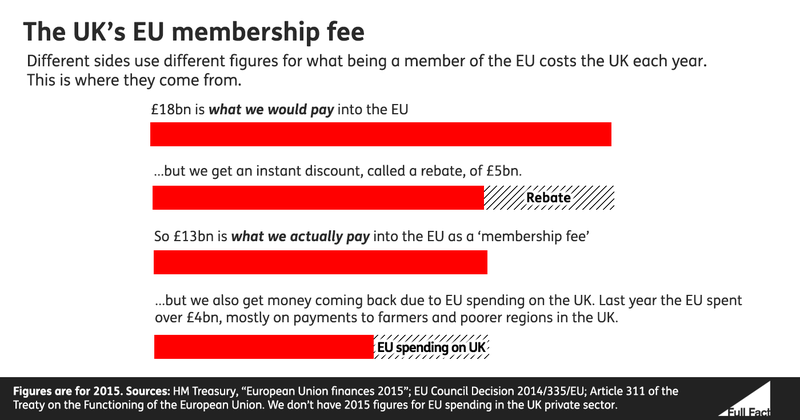9 June's BBC Question Time, factchecked
On the Question Time panel last night were Conservative leader of the House of Commons Chris Grayling MP, Labour's shadow foreign secretary Hilary Benn MP, UKIP leader Nigel Farage MEP, comedian and campaigner Eddie Izzard and columnist Allison Pearson.
We've checked the panel's claims on EU immigration, the economic impacts of the EU, and the UK's EU membership fee.
Join 72,953 people who trust us to check the facts
Sign up to get weekly updates on politics, immigration, health and more.
Subscribe to weekly email newsletters from Full Fact for updates on politics, immigration, health and more. Our fact checks are free to read but not to produce, so you will also get occasional emails about fundraising and other ways you can help. You can unsubscribe at any time. For more information about how we use your data see our Privacy Policy.
EU immigration
“508 million people… if they wish, can come to this country. We have no control. The only way we get control is to vote to leave the European Union”—Nigel Farage
“You [the government] say you can’t control EU immigration. 184,000 people are coming from outside the EU. So even on the bit you can control, you’ve done nothing to bring numbers down.”—David Dimbleby
The EU’s population is indeed an estimated 508 million. But EU rules on free movement of people only apply to citizens of the European Economic Area and Switzerland.
So there are about 440 million people outside the UK who could potentially live and work here.
Just over 3% of EU citizens lived in another member country in 2015.
We can turn away an EU national only if either their actions are a “genuine, present and sufficiently serious threat affecting one of the fundamental interests of society” or, later on, if they can’t support themselves financially here.
Beyond that, the UK government can't control how many EU nationals come to live here.
Mr Dimbleby is right to point out that we can limit immigration from outside the EU, and that despite this there have generally been more such immigrants than from within the EU. The two are now at roughly similar levels: net migration from outside the EU was an estimated 188,000 last year, compared to 184,000 from inside it.

“Between 2001-2011, EU migrants put in 20 billion into the EU economy. They put in more than they take out. I know people are concerned about immigration, but we have to look at the facts.”—Eddie Izzard
“Eddie is absolutely right, [immigrants] contribute more into our economy than they take out. You know what that money goes on? Helping to pay for our schools and our NHS”—Hilary Benn MP
Mr Izzard’s figures are likely to be based on research from a few years ago, which estimated that recently-arrived EU immigrants put about £20 billion more into the public finances between 2001 and 2011 than they took out.
This study alone can’t provide the definitive answer to how much immigrants contribute to the public purse. Researchers make different assumptions which affect their numbers. Most studies find the impact of immigration in general is relatively small, costing or contributing less than 1% of the UK economy.
It’s unclear how much the situation since 2011 has changed. The study did find smaller positive—and in some cases negative—contributions of recent EU immigrants following the financial crisis in 2008.
There’s been recent suggestions this trend may have continued, meaning a negative contribution for immigrants from countries who joined the EU in 2004.
Immigration and housing
“At the moment we have to build one new house every four minutes night and day just to cope with current levels of immigration”—Nigel Farage
This is plausible, although we can’t be certain about immigrants’ housing needs and there’s not enough clear research that would give us better figures.
Net migration into the UK is currently estimated at 333,000 people a year. A difference of 333,000 means a household every four minutes, if you assume that they took up the average UK household size of 2.4 people.
We need to be cautious about this. It’s not clear that immigrant households—at least those of recently-arrived immigrants—will be the same size as the UK average. Past research has suggested that recently-arrived immigrants tend to take up fewer households than the rest of the population. If that was the case, the number of extra households directly due to immigration could be lower.
We also need to be careful about assuming this will continue. The current level of immigration is nearly the highest recorded and it’s difficult to say whether it will continue, increase, or decline in the future.
The government does publish household projections just for England and estimates the impact of immigration. These are described as the “starting point” for working out how many houses we will need, according to government planning guidance. But these are based on past immigration estimates and are not necessarily a good guide to the future.
Economic impacts
“all the economists and all of the studies have said we will be worse off [by leaving the EU]"—Hilary Benn
Not quite all economists agree, but there is a wide consensus in the profession that leaving would come at some economic cost.
Studies looking at both the short term and long term impact on the economy generally conclude that it would be a bad thing.
Other organisations, such as the Bank of England and International Monetary Fund, agree that the economy would suffer without having done a detailed study that puts numbers on the damage. Specific figures depend on assumptions made in economic models.
EU membership fee
“[£350 million a week] is the gross figure, the official Office for National Statistics figure for our weekly contribution to the European Union, table 9.9 of the ONS Pink Book 2014. We get about half of that money back with strings attached”—Chris Grayling MP
“The £350 million, they give us half back of our money, but they decide where it goes... they absolutely decide where [the rebate] goes… they do!”—Allison Pearson
“Is it true the EU tells us where to spend the rebate?”—David Dimbleby
“No it doesn’t”—Nigel Farage
Mass confusion reigned on how much the UK pays in membership fees to the European Union. It is not correct that the up-front payment is £350 million a week, because the UK’s rebate on that sum is a discount, not a refund.
£350 million a week is about what we would pay if not for the discount that the rebate provides. The Treasury and the European Commission have both confirmed to us that the actual payment is the gross contribution minus the rebate.
So because the rebate amount never leaves the UK, the EU cannot control where it’s spent.

The UK Statistics Authority agrees, saying that it is “disappointed to note that there continue to be suggestions that the UK contributes £350 million to the EU each week, and that this full amount could be spent elsewhere”.
As for the ONS Pink Book mentioned by Mr Grayling, it is true that table 9.9 seems to show a gross figure of £19 billion in payments. But the ONS has also made clear that “this amount of money was never actually transferred to the EU”.
So what are the actual payments? For 2015, an estimated £250 million a week. As the Leave side say, some of that (roughly £80 million) comes back in EU grants and spending. More goes directly to the private sector, although we don’t have 2015 figures for that.
It’s fair to say we don’t control these payments. And the UK does get back less than half of the money it pays to the EU in most years.
Depending on whether you take the fee before or after this money comes back, our EU budget contribution is between 1% and 2% of government spending.
But that doesn’t mean we could lavish money on the NHS. As the Institute for Fiscal Studies has concluded, there is “virtual unanimity” among economists that leaving would come at an economic cost, which in turn would affect the public finances - to the tune of £20 to £40 billion a year, in its estimate. That’s more than enough to wipe out the membership fee savings.